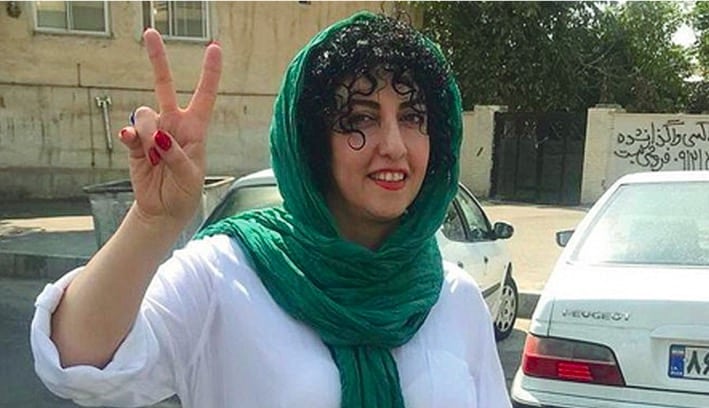
The Universal Declaration of Human Rights lies at the heart of global efforts to end the death penalty. So as its 75th anniversary approaches on Dec. 10 and as we mark the 21st World Day Against the Death Penalty, on Oct. 10, we welcome the steady progress to ban such measures by countries across the globe.
When the human rights declaration was adopted in late 1948, only 14 countries had abolished capital punishment. Today, more than two-thirds of the world’s nations are abolitionists in law or in practice: at least 113 countries have ended this cruel punishment for all crimes, eight have abolished it for ordinary crimes and 24 others have not executed anyone for more than a decade.
The recent past has been marked by consistent progress on abolition in Africa, including in Chad (May 2020), Sierra Leone (July 2021), the Central African Republic (May 2022), Equatorial Guinea (August 2022), Zambia (December 2022) and Ghana (July 2023). In Asia, Kazakhstan (December 2021) and Papua New Guinea (January 2022) joined the abolitionist movement, while Malaysia ended the mandatory death penalty in April 2023, with the law providing the possibility for those in death row to apply for re-sentencing.
The Universal Declaration of Human Rights lays a sound foundation for developing international standards aiming to end the death penalty. The International Covenant on Civil and Political Rights and its second optional protocol provide clear guidance to strengthen the process. Additionally, the Convention on the Rights of the Child, ratified by 196 countries, but not by the United States, bans the imposition of the death penalty for crimes committed by people under age 18 at the time of their offense.
Despite these major gains, pressing concerns persist:
- Capital punishment is shrouded in secrecy and legal uncertainty in many of the countries that retain the death penalty, where sadly most of the world’s population reside
- Reports in 2022 suggest records of almost 900 executions, with more than 2,000 people being sentenced to death
- It is shocking that women and people with mental or intellectual disabilities are not spared the death penalty. Estimates suggest that women make up nearly 5 percent of the world’s total population of people facing a death sentence and nearly 5 percent of those executed. But this may be the tip of the iceberg. Often women who are sentenced to death for murder are victims of gender-based violence, which is not adequately raised in courts. Women charged with such murders are also at risk of gender-based violence in prison
- Capital punishment remains a serious risk and, in some cases, a tragic reality for children: those who are sentenced to death, as well as children whose parents or caregivers are in death row or have been executed
In our most recent report, “Children, Youth and Death Penalty,” the International Commission Against the Death Penalty, a nonprofit association based in Madrid, found that while most countries no longer execute children, there are still those where the death penalty is lawful and legal safeguards are lacking to prevent its imposition on children. Indeed, there are countries, albeit few, where children continue to be executed.
In 2021, four juvenile offenders were reportedly executed in Iran and Yemen and at least two children were executed in North Korea; moreover, at least 87 children faced a death sentence, 80 of them in Iran. From 1990 to 2022, Amnesty International recorded 163 executions of children in 10 countries: China, the Democratic Republic of Congo, Iran, Nigeria, Pakistan, Saudi Arabia, South Sudan, Sudan, the US and Yemen.
You might be interested in these posts.
[display-posts taxonomy=”category” tax_term=”current” orderby=”date” posts_per_page=”3″ wrapper=”ul” content_class=”pb-inpost-list” wrapper_class=”pb-inpost-layout” exclude_current=”true”]
A main argument from countries that carry out executions of children is the difficulty of confirming how old they are, given the unreliable age determination assessments. Globally, according to Unicef, almost one in three children under age five lacks legal proof of identity. These include 166 million children who are not registered and another 70 million who do not have a birth certificate. Consequently, these children risk being treated as adults by the criminal justice system and deprived of legal safeguards that children are entitled to under international human rights law.
Risks are also high for children whose parents or close relatives face the death penalty. As our new report highlights, these children endure agonizing moments of fear, pain and uncertainty. Alongside their long-lasting trauma, they become encircled by stigma, prejudice and discrimination. These are daunting circumstances but not inevitable.
As we commemorate World Day Against the Death Penalty and soon the 75th anniversary of the Universal Declaration Human Rights, we feel reinvigorated in our commitment to build a world free of the death penalty. This is a cruel, inhuman punishment that is contrary to human dignity. It is heavily biased against the most disadvantaged and marginalized people among us and presents a constant risk of executing an innocent.
Rajiv Narayan, executive director of the ICDP, contributed to this article.
Navi Pillay is president of the International Commission Against the Death Penalty. Previously, she was president of the International Criminal Tribunal for Rwanda from 1999 to 2003 and presiding judge in the trial of Ferdinand Nahimana, Jean-Bosco Barayagwiza and Hassan Ngeze (the “Media Trial”). She later served as a judge on the International Criminal Court and was the United Nations High Commissioner for Human Rights from 2008 to 2014.
Marta Santos Pais is commissioner of the International Commission Against the Death Penalty. She is an international human rights lawyer with more than 35 years of experience on human rights, children’s rights and international legal cooperation. In her numerous roles at the United Nations, she was the first special representative of the secretary-general on violence against children, from 2009-2019.
This post was originally published on this site be sure to check out more of their content.










